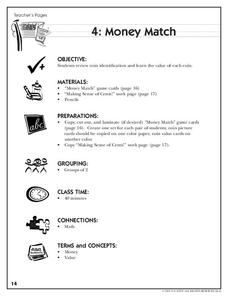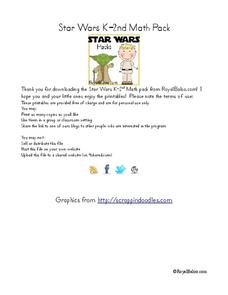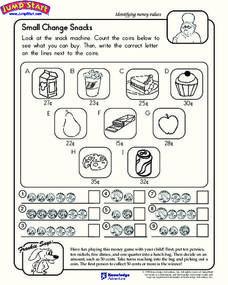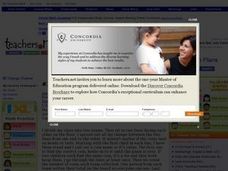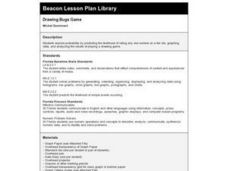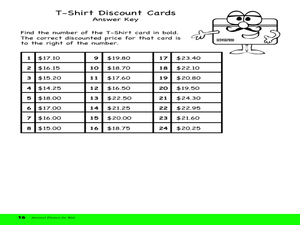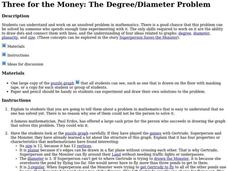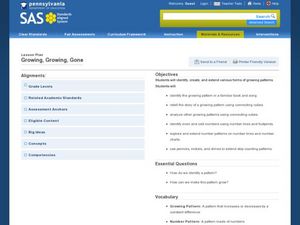Curated OER
Money Match
Playing a game can be educational, pupils use this matching activity to identify coins and their values. This is a great way to have learners practice their money sense.
Illustrative Mathematics
Field Day Scarcity
Introduce young mathematicians to concepts of financial literacy with this open-ended word problem. With seven dollars to spend during field day and given a list of available items and their prices, children must determine how they want...
Royal Baloo
Star Wars K-2nd Math Pack
Included in a Star Wars themed packet, young padawans enhance mathematical skills such as graphing, computing using basic operations, counting numbers and money, telling time, and measuring. Scholars play a game of sudoku, read number...
Practical Money Skills
Saving and Investing
You have to have money to make money, especially in the world of banking and investments. High schoolers learn about interest rates, saving and investment options, and ways to stay aware of their money's security and earning ability with...
Curated OER
Small Change Snacks
In this counting coins worksheet, students count the value of the coins at the bottom and match them with the snack they can buy at the top. Students complete 9 problems and 9 matches.
Curated OER
Classroom Supplies
Challenge young mathematicians to buy classroom supplies by staying within the means of a $1,000 budget. The mathematical activity provides learners with the opportunity to decide what items from the supply list would benefit a class of...
EngageNY
Mid-Module Assessment Task: Grade 8 Module 6
Make sure pupils have the skills to move on to the second half of the module with a mid-module assessment task. The formative assessment instrument checks student learning before moving on to the rest of the lessons in the unit.
Illustrative Mathematics
Oakland Coliseum
Help algebra learners relate a real-life function that happens at the Oakland Coliseum every time the Raiders play. The resource states that the revenue of the Oakland Raiders home games is a function of the number of seats sold and the...
Curated OER
LESS THAN ZERO
Upper graders study how to extend a vertical number line to include negative numbers; order numbers on the number line; and find the distance between numbers on a number line. They will begin with a game using dice to explore...
Curated OER
Coin Hunt and It's Variations
Students play a game designed to give them practice identifying coin names and values. They form two lines with coins spread out in between the teams and when the teacher calls out a coin, the two in front scramble to find the specified...
Curated OER
Grade 5 Basic Math
In this grade 5 math worksheet, 5th graders answer a set of 22 multiple choice problem solving and estimation questions. Worksheet may be completed on-line and answers submitted.
Alabama Learning Exchange
No More Money Trouble
Young consumers explore money identification and counting. In this cross-curricular money instructional activity, they participate in comprehension and writing activities prior to and after reading the book Money Trouble by Bill Cosby....
Curated OER
Drawing Bugs Game
Second graders explore probability by playing a drawing game with dice. After they roll a die, they draw a tree diagram to illustrate each of the possible outcomes.
Curated OER
Estimating and Counting Money
Learners explore the concepts of estimating and rounding. In this estimating and rounding lesson, students play a game of tic-tac-toe. Learners pick items and must estimate their cost by rounding. Students estimate the costs of pretend...
Curated OER
Magic Number
Students create addition sentences. They review number lines and how to jump between numbers to solve equations. They play the "Magic Number" game by using a spreadsheet and guessing numbers. They discuss how they found the magic numbers.
Mathalicious
Pic Me!
Finally! Math and Instagram have come together to discuss the correlation between likes and followers. High schoolers can't help but want to discover what makes one account more popular than another by developing a line of best fit and...
Curated OER
Rationals
In this rational numbers worksheet, 9th graders solve 14 various types of problems relating to rational numbers that include simplifying each equation and reducing to lowest terms to using the order of operations to simplify equations....
Curated OER
Wise Shoppers
Students complete several activities to learn about currency and the functions of money. In this money functions lesson, students complete activities to learn what are the functions of money. Students calculate item prices with...
Curated OER
Three for the Money: The Degree/Diameter Problem
Students explore the degree, diameter, planarity, and size of graphs. In this degree, diameter, planarity, and size of graphs lesson, students try to construct a graph with more than 12 vertices that satisfy all other requirements. ...
Charleston School District
Review Unit 4: Linear Functions
It's time to show what they know! An assessment review concludes a five-part series about linear functions. It covers all concepts featured throughout the unit, including linear equations, graphs, tables, and problem solving.
Curated OER
Introducing money (Elementary, Mathematics)
Students study the penny, nickel, dime and quarter, one each day for four days, using a magnifying glass to identify the similarities. Then students discuss differences and value and learn a 'rap' to memorize values.
Curated OER
Growing, Growing, Gone
Budding mathematicians identify growing patterns in numbers and songs then create their own patterns. They look at number patterns and language patterns and then create their own using money and footprints.
Curated OER
Writing Equations from a Table
Students use coordinates in a table to write equations. In this algebra instructional activity, students discuss rate of change as it relates to slope and x and y values. They plot the points from a table to graph their lines and write...
Curated OER
Analyzing Equations Through Slope and Y intercept
Students analyze equations using the slope and y-intercept. In this algebra lesson, students identify the slope using a and the intercept using m. They graph linear equations based on the slope and intercept.


